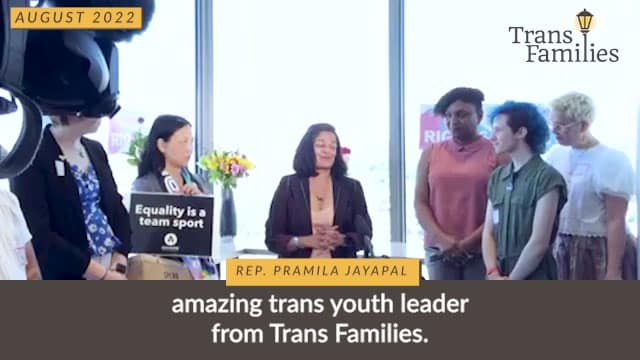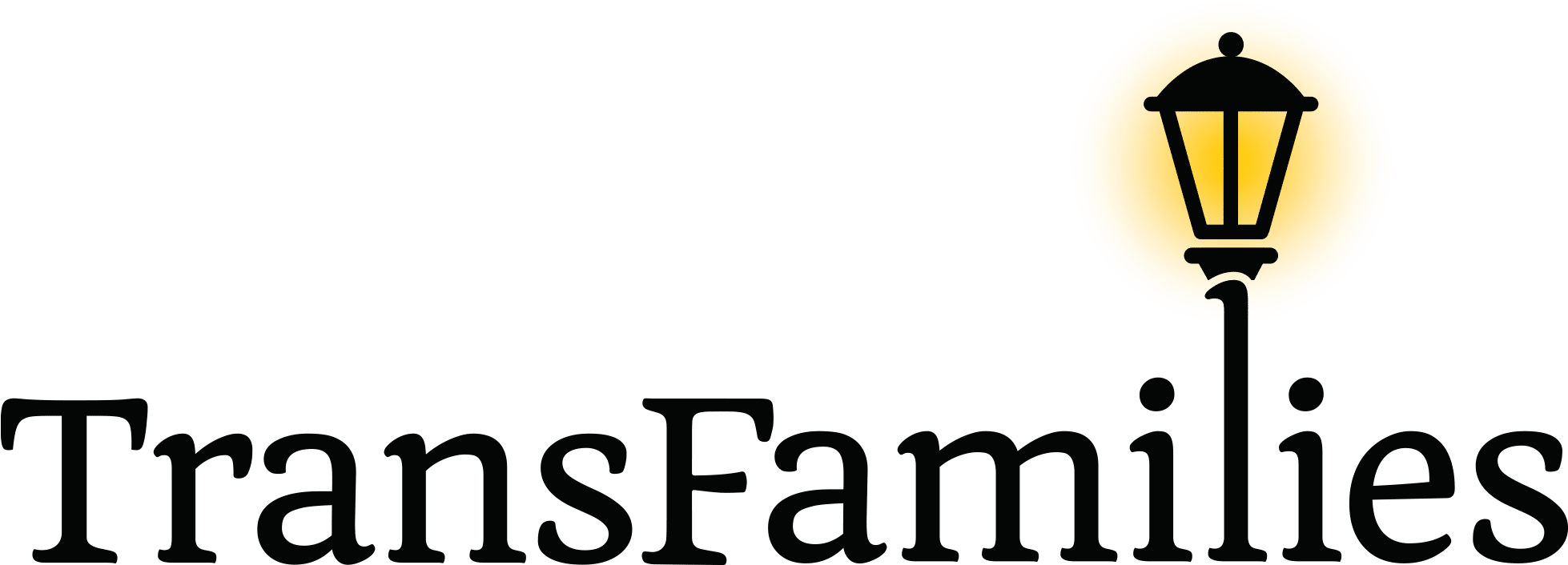WATCH: Trans Families Youth Leader Speaks in Support of Trans Bill of Rights

On August 15, Trans Families joined U.S. Representative Pramila Jayapal (WA-07), Utopia Washington, Lavender Rights Project, Statterbeg Foundation, and other community groups and leaders to celebrate the launch of Trans Bill of Rights. Aydian, a trans masc and nonbinary young person from the Trans Families community, spoke at the event.
Aydian has been involved in Trans Families youth programming since his parents became members of Trans Families after he disclosed to them. Aydian is currently in our youth leadership development program, TYTAN (Trans Youth Taking Action Now), and is going to school in the fall to pursue a career in counseling to work with transgender youth.
Watch Aydian talk about his experience as trans high schooler, discuss the importance of community, and talk about what the Trans Bill of Rights means to him and other young people. The transcript follows the video.
My name is Aydian, my pronouns are he/they, and I am white, trans masc, and non-binary. I turned 18 a few weeks ago, and am headed off to college this fall.
It’s always so powerful to be surrounded by community like we are right now. I love being in spaces where I know that everyone around me wants to support and uplift transgender/nonbinary people.
Community is especially essential to the well-being of trans youth. I just graduated from high school and went through most of that experience as a transgender/nonbinary kid.
As a kid, I was extremely lucky to have friends and family who supported me in finding my authentic self. My parents found Trans Families – an organization that began here in Seattle but is now national. Trans Families creates a support system for parents with transgender/nonbinary kids. That community was essential for my family. I am here today as an empowered, self-assured young person because of that community.
Through Trans Families, I was able to meet kids like me from across the country. And, because we don’t live in the same place, I know that we don’t have all the same legal protections. Our rights as transgender/nonbinary people are often determined by our zip code.
Across the country, our rights as transgender people are a patchwork of protections, gray area, and sometimes downright hostility.
Even when I’m laughing during meetings for our youth development program, TYTAN, I’m acutely aware that without national protections, like the ones laid out in the Trans Bill of Rights, all of us are experiencing vastly different levels of legal protections.
And within localities, we need stronger protections everywhere to ensure everyone has equal access to live their authentic lives.
In my high school, I was the president of our LGBTQ student group. With that, came the unique opportunity to hear the stories of other trans/nonbinary youth. And as I listened to these stories, I learned how incredibly privileged I am. Even as I was experiencing implicit and explicit transphobia, I was still being seen as a white man in a world built upon racism and sexism.
While I have faced hardships, while I have been marching uphill for years, I had privilege that not everyone has had.
I am white, and if I choose to be; I can be male-passing. Many of my peers — my friends — don’t have that privilege. Many of them are Indigenous, Black, Jewish, Muslim, disabled. These are all things that they can’t hide, nor should they have to.
But being trans on top of another minority identity can make even walking to school terrifying. It doesn’t have to be like this.
I feel thankful to be a part of a community like Trans Families. For my parents and me, meeting others like us helped us to create a roadmap for our journey as a family. But, not everyone has a community like Trans Families. And, everyone deserves legal protections that allow them to become the successful people that they want to be.
The Trans Bill of Rights is a similar roadmap, not just for legal protections to prevent discrimination, it also actively invests in the well-being of transgender/nonbinary people. It is not enough to just make sure that my community has access – we also need to be proactive. We need to recognize historical power imbalances and systemic harms that my community has faced by investing in community services and expanding access to health care providers who understand the importance of trans-competent and ethical health care.
The Trans Bill of Rights does all of this.
This is all important to me as a transgender/nonbinary person myself, of course. I’ve seen how important supportive communities can be for transgender/nonbinary kids, and I actually chose my career path because I experienced that firsthand. When I was a junior in high school, I began co-facilitating a Trans Families support group for trans/nonbinary middle schoolers.
I was so moved by the confidence they found in this space together, I decided that I wanted to spend the rest of my life fostering supportive spaces for kids like them – the kid I was — and, this fall, when I start college, I’ll be pursuing a career in counseling while continuing to co-facilitate that group.
All transgender/nonbinary people, including the middle schoolers in that group, are resilient. But, transgender/nonbinary people shouldn’t have to be resilient in order to live. The Trans Bill of Rights paves a path for everyone to become successful, happy, thriving members of our community.
I’m honored to be here on behalf of transgender/nonbinary young people and their loved ones, and I encourage everyone to seek out more stories from trans/nonbinary youth. Every trans voice, every trans experience is unique and valuable, and reflects why the Trans Bill of Rights is so important.
